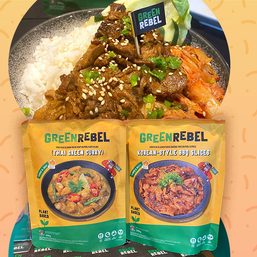SUMMARY
This is AI generated summarization, which may have errors. For context, always refer to the full article.

MANILA, Philippines – Want to start living a healthier life? Smoothies are a great, easy, and yummy gateway to better health – this refreshing to-go beverage is packed with fruits, veggies, and superfoods that provide your body fiber, vitamins, minerals, antioxidants, and many more benefits.
You can easily get them at cafés, but it’s cheaper to make them yourself at home. It can even be healthier too, as you have full control of what nutrients you’re putting inside your body. Plus, you can get creative with your daily smoothie combos!
I try to make smoothies at least thrice a week – I start with one or two kinds of frozen fruits such as berries, banana, mango, melon, peaches, kiwi, pineapple, and/or grapes. I also add a cup of frozen greens such as spinach, pechay, lettuce, and sometimes even local staples like alugbati and malunggay.
I blend everything together with my choice of dairy-free milk (either oat or almond), and sometimes add a scoop of peanut butter, cacao nibs, or honey to sweeten it up. Next is my powerhouse of superfood supplements – I usually add a scoop of chia seeds, ground flax seeds, and moringa powder for maximum health benefits (I hardly taste them either). And there you have it! I always feel good every time I finish my nutrient-packed, fiber-filled smoothie.
If you’ve also wanted to amp up your smoothies and jumpstart your health in the easiest way possible, we’re here to help. Here’s a simple guide on a few popular superfoods and their respective health benefits!
Just remember that these can’t singlehandedly improve your health and prevent or treat diseases, but they can greatly aid your health as a supplement to a balanced diet and active lifestyle. Don’t forget to consult your doctor or dietitian before making any major health changes!
Chia later!
They’re popular in diet foods and drinks for many reasons – chia seeds are hailed to be the richest plant-based source of omega 3-fatty acids, according to the Harvard School of Public Health. Omega-3 fatty acids are anti-inflammatory nutrients that keep your eyes, heart, brain, and bones healthy, and also help lower triglyceride levels and blood pressure.

Chia is also a “complete protein,” meaning it contains all nine essential amino acids that cannot be made by the body. It’s also very rich in soluble fiber (good for the gut) and mucilage, which is what gives chia that distinctly “slimy texture” when soaked in water. It makes for yummy chia puddings!
These fibers are what makes chia a good diet aid for weight loss and diabetes management – they can help lower bad cholesterol and slow down digestion, which can prevent blood sugar spikes after eating a meal and promote a longer feeling of fullness.
Chia seeds are also a good source of polyunsaturated fat, protein, calcium, phosphorus, and zinc.
Cut flax some slack
Like its sibling chia, flax seeds are a good source of polyunsaturated fatty acids, dietary fiber, and omega-3 fatty acids, and a favorite heart-healthy, plant-based protein source of many vegans that even helps lower LDL cholesterol. Just make sure to enjoy them in ground form for easier digestion, and not whole!

According to the British Heart Foundation, these anti-inflammatory flax seeds are growing in popularity due to its possible benefits of reducing cardiovascular diseases, decreasing the risk of certain cancers, its laxative effect that aids digestion, and even the alleviation of menopausal symptoms and osteoporosis. It can also relieve constipation.
If you want a well-rounded seed with various nutrients, choose chia, but if you’re looking for a bigger omega-3 boost and more protein, go for flax. Don’t worry, they don’t impart any earthy taste to your smoothies!
Go green with spirulina
This dark-green superfood powder is potent in taste, antioxidants, and health benefits – it’s rich in protein, vitamins, essential amino acids, minerals, and essential fatty acids not made by the body. It’s basically a powerful plant-based immunity booster and heart-health warrior!

The anti-inflammatory spirulina, which is from blue-green algae, can help optimize cholesterol levels, lower blood pressure, improve anemia, and enhance muscle strength and endurance. The Natural Library of Medicine Journal said that spirulina supplements have shown in some patients a “significant reduction” in blood cholesterol, triglycerides, and LDL cholesterol, and an increase in HDL cholesterol, which is the good kind. Note: It does come with a strong, grassy flavor!
More of moringa
Moringa (M. oleifera) is a familiar superfood close to home – it’s also called malunggay in the Philippines! Known to be a great source of natural antioxidants, this superfood is used for alleviating malnourishment, meaning it’s got everything a body needs to survive and even thrive.

This indigenous plant is rich in highly digestible protein, calcium, iron, potassium, magnesium, vitamins, essential amino acids, antioxidants, and carotenoids, which are found in many fruits and vegetables. Aside from being anti-inflammatory, moringa can also be cholesterol-lowering, anti-diabetic, antibacterial, and anti-hypertensive.
Because it is also dubbed as a “mother’s best friend” in the Philippines, moringa is commonly used in lactation-stimulating pastries, milk, desserts, bread, and food for breastfeeding mothers who want to increase their milk production. Plus points for its subtle taste!
Time for turmeric
This bright-orange powder and sibling of the ginger root is traditionally used as a medicinal herb in many parts of Asia due to its strong antioxidant, antimicrobial, and anti-cancer properties. It’s the active compound of curcumin found in turmeric root that’s powerful in reducing inflammation and is the key in helping to prevent or even treat certain diseases.

It’s also used for pain relief (turmeric rubs and ointments are popular) for joint pain, arthritis, or swelling. Not only is it good for the heart, liver, respiratory, digestive, and immune health, but it’s good for the brain too – it is said to help prevent Alzheimer’s, improve memory, and even help with symptoms of depression.
Tip: It is also recommended to pair curcumin with piperine, which is a compound in black pepper. Piperine is said to help enhance curcumin absorption by up to 2000%, improving this superfood’s bioavailability. Just add a pinch of ground black pepper to a spoonful of turmeric – you won’t even taste it!
Berry good for your heart
Last but not least are, of course, berries! Berries of all kinds are used as the base for many delicious smoothies, and for good reason – they’re tart, sweet, refreshing, versatile, and packed with many health benefits. Strawberries, blueberries, raspberries, cranberries, and blackberries contain good amounts of potassium, magnesium, vitamins C and K, fiber, and prebiotics for a healthy and happy gut.

These anti-inflammatory fruits can also lower the risk of Type 2 diabetes, heart attacks, cardiovascular disease, and obesity, because they’re high in antioxidants and anthocyanins, which also help fight free radicals. Just consume them in moderation, as they also contain sugar.
Among all berries, bluberries are the highest in sugar but are best for immunity, because it contains phytonutrients, which work with other essential nutrients to promote good health. Blackberries are the highest in antioxidants and fiber, while cranberries are used to treat urinary tract infections and are the lowest in sugar. Black raspberries are also the most nutrient-dense of them all, and have little natural sugar. Also, don’t forget acai berries and goji berries!
Berries also work well with other fruits, like banana, mango, apple, peach, and pineapple. – Rappler.com
Add a comment
How does this make you feel?





There are no comments yet. Add your comment to start the conversation.